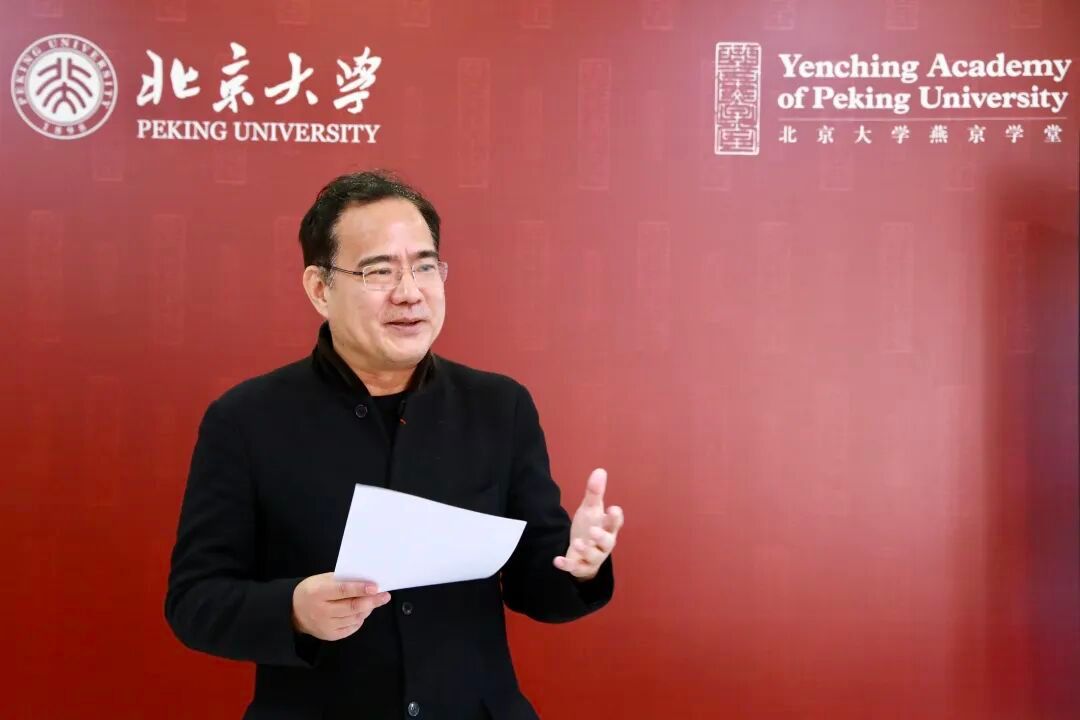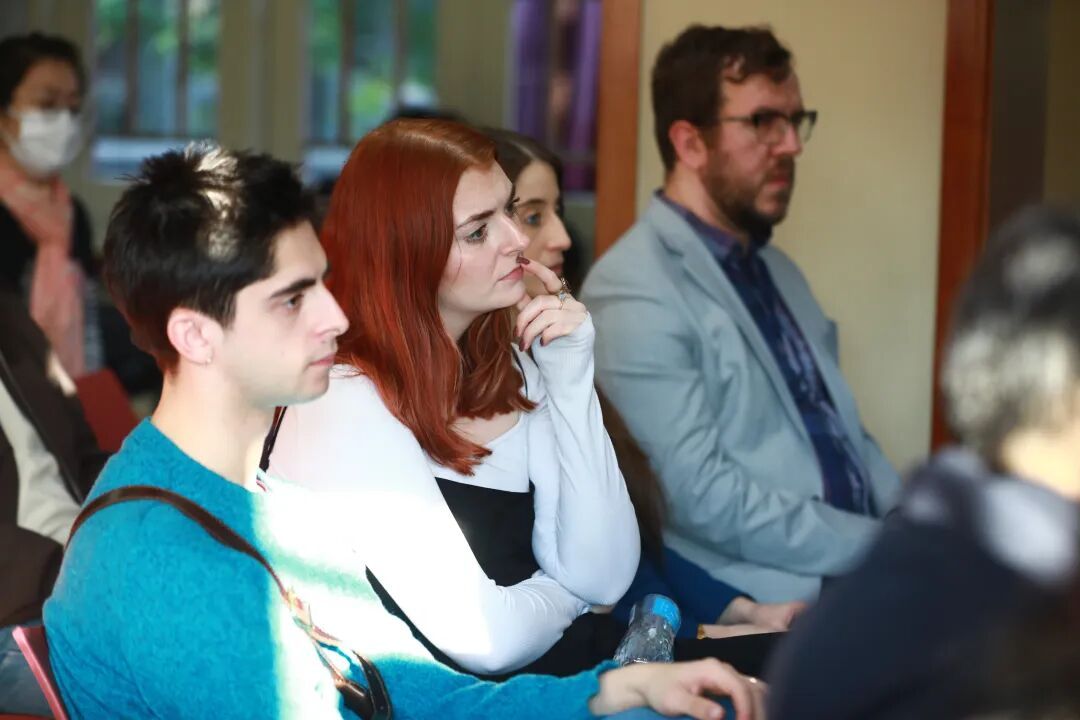During his state visit to the UK in October 2015, President Xi Jinping delivered an important speech entitled “Work Together to Promote Openness, Inclusiveness and Peaceful Development” at City Hall in the City of London, stressing that China and the UK should, by taking a farsighted and strategic approach, bear openness and inclusiveness in mind, following the principle of win-win cooperation, and be bold and pioneering in their approach, seizing the opportunities of the times to jointly usher in the “golden era” of bilateral relations, and together make new and greater contributions to the noble cause of peace and development of mankind. In his speech, the Chinese President mentioned several renowned literary works and figures from both China and the UK, and recalled his youthful experiences with Shakespeare’s works. He believed that by reading Shakespeare, one is not only impressed with the British playwright’s literary ingenuity but also gains profound insights. President Xi drew a parallel between Tang Xianzu and Shakespeare. A contemporary of Shakespeare, the Ming dynasty playwright Tang Xianzu has been acclaimed as the “Shakespeare of the East”. His literary legacy has been embodied in the world-renowned dramatic works, including The Peony Pavilion, The Purple Hairpins, The Nanke Dream, and The Handan Dream.
Both Tang Xianzu and Shakespeare died in 1616. The year 2016 marked the 400th anniversary of their deaths and featured joint commemorative events held by Chinese and British scholars. In 2015, President Xi Jinping addressed the Chinese and British scholarly circles on the coming commemorative occasion. In commemoration of the tenth anniversary of Xi’s speech and the 410th anniversary of the two playwrights’ deaths, the government of Fuzhou, Tang Xianzu’s hometown, hosted the Tang Xianzu International Drama Exchange Month in October. The exchange will run throughout November. Experts and performing troupes from around the world are invited to participate in performances and cultural exchange events. The University of Birmingham's Shakespeare Institute located in Stratford-upon-Avon, Shakespeare’s hometown presented its adapted English-language version of The Peony Pavilion at the Exchange Month. The institute’s delegation arrived at Peking University on October 27.
On the afternoon of October 27, the Shakespeare Institute delegation alongside the Yenching Scholars and teachers delved into the cultural legacy of Tang Xianzu and Shakespeare.
Prof Dong Qiang, Dean of Yenching Academy, met with the delegation and hosted the seminar, extending the warm welcome to the delegation from Shakespeare’s hometown. Stratford-upon-Avon, a small town on the River Avon as indicated by the “upon” in its name, is known worldwide as Shakespeare’s birthplace. The preposition “upon” functions as an indicator for the locational relation between the town itself and the river. Furthermore, it evokes a poetic scene where young Shakespeare, gazing into the blue sky reflected in the river, dived into human complexity, society and history, rather than being self-obsessed. During the same period on the other side of the world, Tang Xianzu grew up in his hometown Linchuan, by the Fuhe River. The place name Linchuan literally means “by the riverside”. Looking into the flowing water, Tang Xianzu felt enlightened by Confucius’s teaching, “Time flies and waits for no one” and pondered over human values in the vastness of nature and the cosmos. With this contemplation, Tang Xianzu left a literary legacy built on dreams and love. Humanity has left an intellectual heritage over the passage of time, yet Shakespeare and Tang Xianzu were eminent figures among others within it.

Dean Dong highlighted that by drawing upon rich cultures and traditions, Yenching Academy aims to build bridges between Chinese and other civilisations and boost cross-cultural exchanges between its Scholars, helping them navigate the map of cultural continuity and renewal. He appreciated our Scholars’ passion and effort for cross-cultural exchange, because as they were busy with their internships and academics, our Scholars made time for the performance of A Midsummer Night’s Dream. Prof Huang Bikang’s translation of The Peony Pavilion is noted for its “Shakespearean flavour”, which was accentuated in the performance brought by professors and students from the UK. The poetic Chinese classic drama and the Western performing art ignited sparks of marvel. The performance was a manifestation of cross-cultural collaboration among teachers and students from China and abroad. The English-language version of The Peony Pavilion brings the poetic essence of kunqu opera to the hearts of English-speaking audiences and attests to the shared legacy of different cultures. The English-language performance was undoubtedly a successful new experiment for deepening cross-cultural understanding and in preserving and developing cultural heritage.


Prof Michael Dobson of the University of Birmingham’s Shakespeare Institute recalled with emotion his experience as a teacher at Peking University in the autumn of 1999. He cherished his PKU days and would tend to share it in talks and even in job interviews. The professor was captivated at the moment when he walked on the bridge inside the University’s northwest gate, feeling as if he were in the tranquil garden in The Peony Pavilion. He admired the student’s utter concentration on their studies in such a picturesque place. Prof Dobson is from Shakespeare’s hometown Stratford-upon-Avon. The town may be the best footnote to Shakespeare’s line “All the world’s a stage”. The professor came with reflections on theatre and life and expected to see how a theatrical classic would be interpreted and brought to life. From time to time, Prof Dobson felt that Tang and Shakespeare were like two fellow playwrights, one focusing on reality in dreams and the other on tragicomic complexities of the human condition. Both were masters at illustrating the realities of the real world.

Huang Bikang, professor at PKU School of Foreign Languages (SFL) and Chair of the Shakespeare Society of the CASS Institute of Foreign Literature, delivered a speech. He expressed gratitude for Dean Dong’s support and for the strong backing and commitment from the SFL’s leadership. Prof Huang also extended his gratitude to director Emily C. A. Snyder and Prof Michael Dobson and his outstanding team for their brilliant performance. Prof Huang recalled what made him refocus on the long-shelved study of traditional Chinese opera: Twenty years ago, a student in Huang’s lecture on Shakespeare raised a question about Tang Xianzu’s “marvel stories” and their worldwide impact. Huang has pondered on what Prof Li Funing, his doctoral supervisor, once said: a Chinese scholar, no matter how well-versed he or she is in American or British literature, can never neglect the position of fine Chinese culture and literature in the world literary landscape.
Prof Huang was deeply impressed by the year 2016, which marked the 400th anniversary of the deaths of Tang Xianzu, William Shakespeare, and Miguel de Cervantes Saavedra, three preeminent literary figures, worlds apart. Academic institutions and theatrical circles in China and the UK held joint events for commemoration. The professor also noted that literature-related topics appeared time and again in President Xi’s address, delivered at City Hall in the City of London during his visit to the UK in 2015, accounting for approximately 10% of the entire speech. In his address, President Xi mentioned many British authors and philosophers and recalled his reading experience of Shakespeare’s works. The Chinese President also noted that Tang Xianzu has been acclaimed as the “Shakespeare of the East” and that Tang’s Four Dreams of Linchuan have gained worldwide recognition. Xi suggested that Chinese and British academic and literary circles hold joint events in commemoration of the three literary giants.

Huang’s aspiration to translate The Peony Pavilion into English with a “Shakespeare flavour” led to his Folger artist-in-residence fellowship in 2019. Over the past two decades, Prof. Huang has navigated the literary chart of Tang Xianzu and Shakespeare like a boat shuttling between shores—with lyrical Chinese plays on one side and Shakespeare’s smooth iambic pentameter on the other. A master translator of both Tang and Shakespeare as he is, Huang has encountered difficulties in his work; however, all his efforts have been rewarded. He couldn’t be happier to see so many Chinese and international young scholars gathered together for Tang Xianzu and Shakespeare. Prof Huang’s “Shakespeare flavour” translation of Tang Xianzu’s Four Dreams of Linchuan has been published, laying a cornerstone for YCA’s performance.
Luca Bustani Wood, director of A Midsummer Night’s Dream and a Yenching Scholar and his fellow YCA Scholars Isabella Concetta Gualano, the lead actress and Kristina Ming-xue Gilje Chiu, the artistic director spoke on behalf of the cast and crew. They extended gratitude to all the fellow students who participated in the performance but were not present at the seminar, because the performance couldn’t have been a success without their support, from script writing and stage setup to costumes and props. It is noteworthy that all the performers are Yenching Scholars, and none of them have received systematic stage performance training. Yet, passionate about Shakespeare’s classical play and the stage experience, they captured the nuances in the play with skilled acting. Of course, the success was a reward for their passion and perseverance: everyone devoted their spare time to practice and rehearsals, from lines and body movements to the inner world of the characters. And with love and dreams, our Scholar-turned-performers transformed their “amateur” performance into a wonder rarely seen in a regular theatre.

In her remarks, Emily C. A. Snyder, director of The Peony Pavilion, noted that President Xi hailed Tang Xianzu as the “Shakespeare of the East” when addressing his London hosts in 2015 and that in 2016, Fuzhou became Stratford’s sister city and donated funds to build a community building in the town. A director in a New York-based troupe, Snyder became unemployed when Broadway fell into stagnation in 2020 due to the COVID-19 pandemic. Making the best of this opportunity, she planned to pursue a PhD and was enrolled at the Shakespeare Institute of the University of Birmingham. There, she met many like-minded friends who are the co-creators of The Peony Pavilion with cast and crew from diverse cultural backgrounds. Snyder hoped to create a dialogue between Chinese and British cultures and to pave a cross-cultural, cross-border path linking Tang Xianzu and Shakespeare and bringing the 16th-century literary giants into our era.

Associate Professor Luo Tian of the Department of French Language and Literature of PKU, Prof Cong Cong, director of the Shakespeare Centre China at the Institute for Advanced Studies in Humanities and Social Sciences of Nanjing University, Hao Tianhu, Qiushi Distinguished Professor, Changjiang Scholar, and deputy director of the Faculty of Arts and Humanities of Zhejiang University, and Libery Myers from the University of Birmingham’s Shakespeare Institute also spoke at the seminar. Liu Hao, secretary-general of the Shakespeare Society and associate professor at Tsinghua University, also attended the seminar. The event was co-organised by the Yenching Academy and PKU School of Foreign Languages (SFL). Wang Dan, Associate Dean of SFL, attended the seminar, and Li Shujing, Secretary of the CPC Committee of the SFL, gave the concluding remarks.






A brilliant theatrical night unveiled the remarkable fusion of East and West on the evening of October 27 at Li Ying Hall in the PKU Centennial Hall. Our Yenching Scholars put on a stunning stage performance of Shakespeare’s A Midsummer Night’s Dream, leading the audience into the forest of love, hatred and innocence. They perfectly grasped the emotional nuances of the play by injecting their own penetrating insights. The team from the University of Birmingham’s Shakespeare Institute staged the English-language performance of The Peony Pavilion, representing the love between Du Liniang and Liu Mengmei through the melodious kunqu opera and elegant English lines with “Shakespeare flavour”. Performed side by side on the same stage, the two plays brought to life the classics from countries on opposite sides of the world, over four centuries ago.






